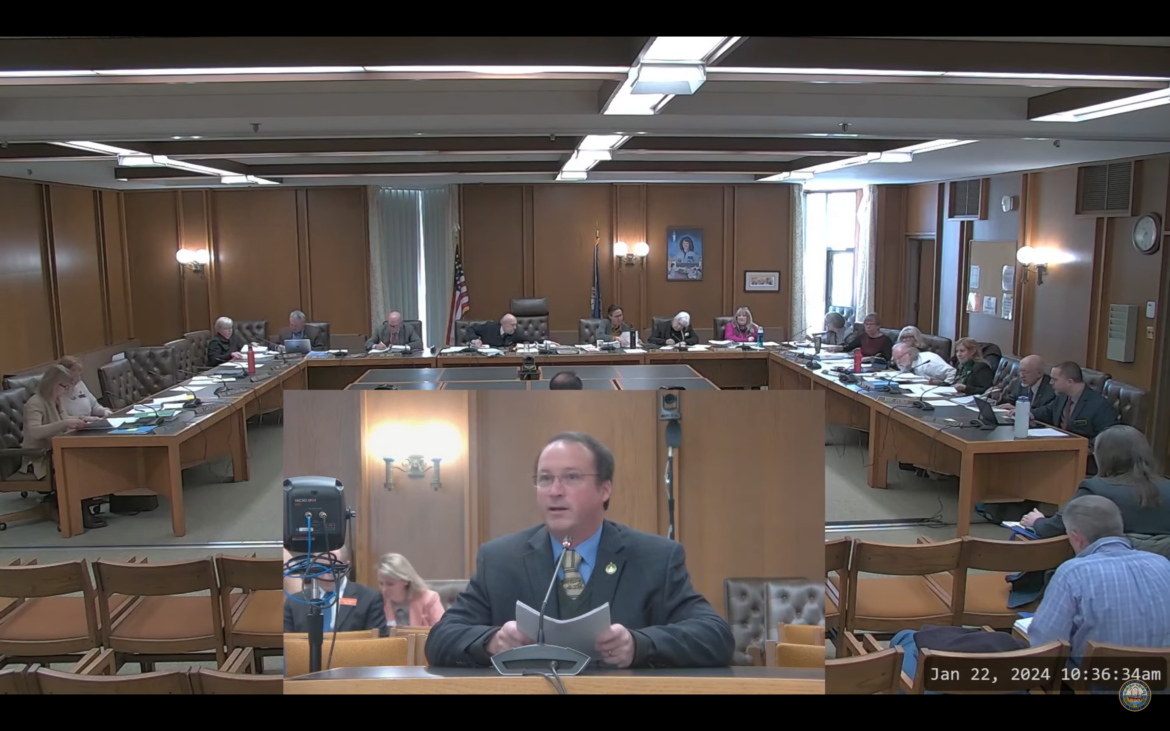By GARRY RAYNO, InDepthNH.org
CONCORD — A proposal to have locally funded education freedom accounts was before the House Education Committee for a second time this term.
House Bill 1652 would allow school districts to establish their own voucher accounts with local property taxpayer money if three-fifths of a school district’s voters at an annual meeting approve the program.
Either 25 registered voters of a school district or 2 percent of all registered voters, whichever is less, can place the question on a school district ballot.
A school district can end the program with a three-fifth majority vote.
The prime sponsor of the bill, Rep. Kevin Verville, R-Deerfield, said “this is deja vu all over again,” quoting New York Yankee Yogi Berra. “I’m coming back for another bite of the apple.”
The identical bill was tabled during last year’s session, and died on the table when the legislature adjourned.
Verville said his town had universal school choice 20 years ago, when students could attend any high school they wanted, but for the past 20 years has had a contract to send all of its high school students to Concord.
At last year’s school meeting, a new contract was voted down and instead an option of three high schools were offered to students: Concord, Coe-Brown and Pembroke.
Verville said more than 50 percent opted to go to Coe-Brown and the remaining high school students go to Concord.
With the options, more students are returning to the Deerfield school system whose parents were not satisfied with the old arrangement, he said.
He said his proposal would double the state adequacy grant of $4,100 so a grant of about $8,000 would be available for a student who is eligible for the program. With a little more money from parents, there are options they could not afford before.
Noting the popularity of the state Education Freedom Account program with about 5,000 kids, “there is a need out there and parents want choices for their children and this is nice local control.”
The money would follow the student, he noted.
The program would be run by an outside scholarship organization just as the state program and that raised some concerns.
Former Representative and committee member, Marjorie Porter, D-Hillsborough, said the bill would give the scholarship organization vast authority over the program. The organization would not be answerable to voters or the community, she said. “You’re giving up authority over your tax dollars to a private organization,” she said.
Porter was also concerned that taxpayers’ money would be going to support religious schools and activities noting there are two places in the state constitution that forbid public money going for religious purposes.
“I find that very difficult to accept,” she said. One of the largest uses of the state EFA grants is to pay tuition to religious schools, private schools and homeschool expenses.
The US Supreme Court overturned one of the constitutional references to the Blaine amendment in recent rulings.
David Trumble of Weare said the program would be unconstitutional just like the state EFA program because the state’s first constitutional obligation is to fund an adequate education for all students — and it is not doing that — before spending money on some other educational alternative.
“You can’t take taxpayers’ money and use as an ATM to go fund private schools,” he said.
Trumble noted EFA students have to sign away all their special education rights under the program.
If you want public money, he said, you should follow public rules, noting the word disability does not appear anywhere in the bill.
Debrah Howes, president of the American Federation of Teachers, said the bill would establish a local voucher program that could easily decimate the local schools, noting the state has a constitutional obligation to provide and fund a robust education system for all Granite State students.
She noted you need school nurses, guidance counselors and para educators and many schools lack them.
“You are asking local taxpayers to pick up the tab for another family’s decision,” Howes said, “a family struggling to meet their tax bill in Concord, so another family can send their child to St. Paul’s.”
With about 5,000 students in the current voucher program, that is 3 percent of all the students in public schools, she said.
“We need to take care of the students who rely on local public schools,” Howes said, “where most parents want their students to go.”
According to the electronic signup system, 16 people support the bill and 378 oppose it.
The committee did not make an immediate recommendation on the bill.
Garry Rayno may be reached at garry.rayno@yahoo.com. Rayno has four decades experience as a reporter in New Hampshire.





